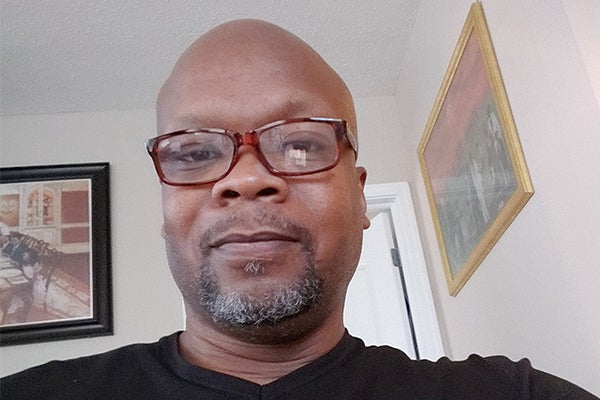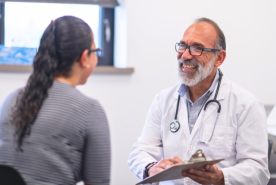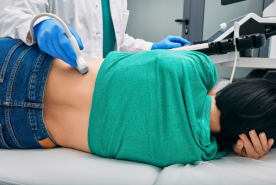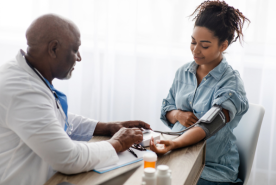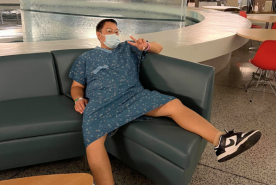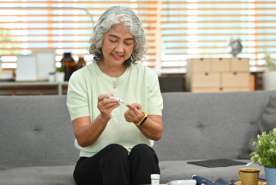May 26, 2020
By Michael Phillips, Transplant recipient and Kidney Advocacy Committee member
I was looking forward to bringing some major changes to my family’s lives this year, including moving for a new job. I was also so excited about attending my first Kidney Patient Summit to advocate for kidney patients in Congress. I was excited to visit with my brother and surprise our parents for our father’s birthday in March. All that instantly changed with the pandemic.
I am a kidney transplant recipient, which I was blessed to receive on January 6, 2019, at Northwestern Medicine. A year later, I received great news that my kidney was functioning well and that I would not have to see the transplant team until 2021.
On March 7th, my spouse & I attended a family birthday party. Later that week, I saw a notice on our family chat that one of my cousins wasn’t feeling well. Then my spouse stated he was not either and started showing symptoms that included sore throat, a chill and tiredness. Later that week, he said he needed to go to the emergency room. I was so nervous, because as a transplant recipient, I was not going to be able to go in with him. I had to drop him off at the emergency room door. That was one of the hardest things I had to do in the 19 years that we have been together.
We live about five minutes from the hospital, so I went home to wait for a phone call. First, they checked to make sure he did not have the flu. They then administered a COVID-19 test and told him to quarantine for 14 days.
Quarantining is quite a task when you have a teenager and live in a two-bedroom apartment in Chicago. So, we did the best we could with our son in his room and me sleeping in the living room. We wore masks, washed our hands and stayed away from each other. The following week, as my transplant team was following up with recent patients, I started to develop symptoms as well. I was fatigued, restless, had no appetite, chills, etc.
My doctor said I might have COVID-19 and that I needed to come to the hospital to be tested. They also told me to bring a few days’ worth of clothes because they might keep me to monitor me and my kidney. They took my temperature, checked my oxygen level and gave me the test for the flu and COVID-19. It took two days for us to learn I had tested positive. I was so glad that the hospital sent me back home, but then our son also started showing symptoms as well.
A few days went by and my spouse was having trouble with a temperature of 104. I took him to the hospital again and I came back to wait for his call. I cried because I was so scared. He called to tell me what was going on. He was having shortness of breath and his oxygen level was at 78%. My husband has diabetes and he was on the verge of going into a diabetic coma.
There was also concern about me as a transplant recipient, even though both our son and I had a very mild case compared to my husband. The concern from my family and friends was heartwarming and overwhelming. There are still times that I don’t know how to express my feelings and gratitude to my family and friends for their support and love.
I am here to report we all have recovered quite well. I am fortunate to say that we are still able to salvage one of those major changes, relocating out of state for a new job. I count myself lucky to have done as well as I did. I lost a relative to COVID-19 and other several family members contracted the virus.
Since I recovered, I have been saddened to learn about the outsized impact that COVID has had on minority communities, as well as rural and poorer Americans, and how many who contract COVID-19 are also developing acute kidney injury (AKI). New data suggests that the mortality rate for kidney transplant patients from COVID-19 is a staggering 30% and that AKI is occurring about 9%of all coronavirus patients, many of whom now need dialysis.
African Americans and Latinos, particularly, have been horribly affected by COVID-19. In Georgia more than 80% of hospitalized patients were African American and mortality rates in Illinois, Michigan, Missouri, Arkansas and Indiana are twice as high among African Americans. In Kansas and Iowa, the infection rate was three times higher for African Americans and Latinos, respectively. Because of this, I am grateful to have the opportunity to share my story at a Congressional briefing later this month hosted by the National Kidney Foundation in coordination with the NAACP and other groups on health disparities around COVID and kidney disease.
As a kidney patient who had COVID-19, I ask my fellow patients to please take this seriously and follow the advice of health experts, their doctor and trusted resources like the National Kidney Foundation. There are many great resources for you to reference, such as NKF’s COVID-19 webpage and Facebook Live events. Please wear your masks, limit your exposure to crowds and quarantine yourself as much as possible.
We still have suffering from COVID-19 in many parts of the country, so let us pray for one another and put differences to the side. It’s time for unity. COVID-19 is nothing to play with and it affects people of all races, economic backgrounds, and those healthy and chronically ill.
